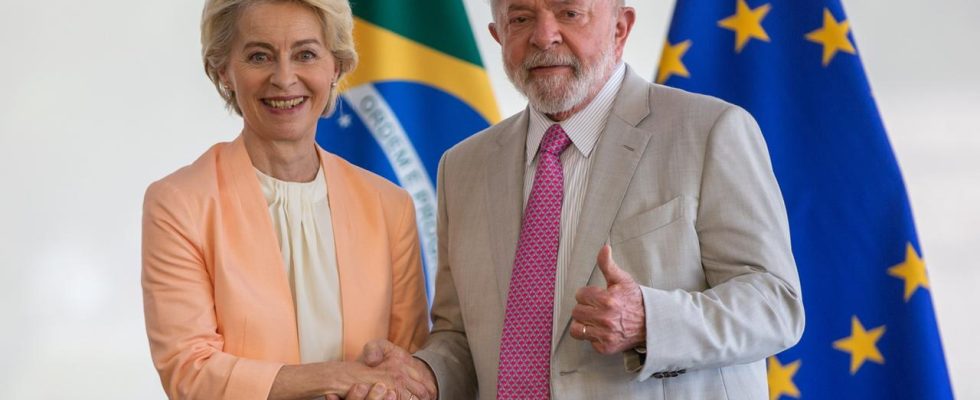The EU is in danger of falling behind China in Latin America. On the continent, people are increasingly surprised about the demands and conditions of the Europeans. Can a summit meeting in Brussels bring new impetus?
The target is the largest free trade zone in the world with more than 720 million people. The EU and the Mercosur countries have been negotiating for more than two decades. An agreement that has been ready to be signed for four years has not yet been ratified.
“I really want to reach an agreement with the European Union,” Brazilian President Lula da Silva insists, “but that’s not possible. The European Union’s latest proposal doesn’t allow for an agreement.”
No written definition
Brussels wants to sanction agricultural products that are produced on land that was cleared after the conclusion of the agreement. During last fall’s election campaign, Lula da Silva promised more protection for the Amazon rainforest. He has been President of Brazil since January.
He refuses to put the protection of the forests in writing. He finds the threat of import bans and penalties from the EU inappropriate. “Strategic partners do not negotiate on the basis of distrust and the threat of sanctions.”
Mercosur agreement as a litmus test
A strategic partnership – that’s exactly what Brussels wants with the countries of Latin America. The Mercosur agreement seems like a litmus test.
Political scientist Oliver Stünkel explains that he speaks weekly with Brazilian politicians and decision-makers in the other Mercosur countries. Nobody really understands what is happening in Europe, how decision-making processes work there. “It’s all a bit confusing. The longer this is delayed, the greater the disillusionment will be if ratification doesn’t take place after all.”
Europe is in danger of falling significantly behind in Latin America. The big competitor is China. The trade volume between the Middle Kingdom and the Mercosur states is around 180 billion dollars, between Mercosur and the EU states a good 120 billion dollars.
What does failure bring?
Where the EU hesitates because of human rights and environmental protection, China cheerfully takes action. Oliver Stünkel warns against letting the EU-Mercosur agreement fail.
“We are not saving an inch of rainforest by not ratifying the trade agreement. The more Latin America can be integrated through European standards, the better it will be. Because the Chinese will not put pressure on the Brazilians to implement any sustainability principles.”
accusation of protectionism
But it’s not just about environmental protection. Argentina’s President Alberto Fernandez accuses the EU states of protectionism, especially in the agricultural sector, and criticizes further imbalances in trade.
Because Argentina has large deposits of lithium, gas, oil and other raw materials on which Europe is urgently dependent due to the war in Ukraine and the associated sanctions against Russia.
Argentina wants more from its partners, says President Fernandez. No one can condemn the countries of Latin America to be suppliers of raw materials that others process and then sell back at inflated prices. That is why Argentina relies on free trade and industrial development.
Von der Leyen promises big investments
According to Commission President Ursula von der Leyen, the EU would like to build on this expectation. The European Union is already the largest investor in the region and more money will flow through Global Gateway, the EU’s international investment plan. “The European Union will invest EUR 10 billion in Latin America and the Caribbean and this is just the beginning, as it will be complemented by private investment and by the contributions of our Member States.”
Greenpeace warns of climate change
The EU-Mercosur Agreement as a blueprint for a new level of relations between Europe and Latin America? Gesche Jürgens from Greenpeace Germany firmly rejects this.
This would lower tariffs for pesticides, for cars with internal combustion engines and for beef. “That means it promotes products that are harmful to the climate and nature. And that no longer fits in with our time at all.”
“Then others fill the gap”
The relationship between the EU and Latin America is not just about trade and the economy. It is also about strategic partnerships and geopolitics. The agreement should therefore also be a platform for dialogue, asserted Commission President von der Leyen.
Foreign Minister Annalena Baerbock was even clearer on her recent visit to South America. She hopes the deal comes about to the benefit of both sides, and if not, “then others fill the gap, like the Chinese for example, who don’t care about social and climate standards, plus we don’t have access then.”
Montevideo’s port as an open gateway for China?
While Brussels is struggling with the Mercosur countries for the big agreement, Beijing is diligently concluding bilateral agreements with the countries of Latin America. In Uruguay, China is already using the port of Montevideo as a base for its gigantic fishing fleet in the Atlantic and Pacific.
Beijing is negotiating intensively with Uruguay about a free trade agreement. The port of Montevideo would become the open gateway in South America for the economic giant China. Lula emphasizes that if Europe wants to work better with Latin America, it will have to reconsider its attitude towards the countries of the South.
“It’s important that we put aside a bit of arrogance and try to negotiate with common sense, for us and for them.”

